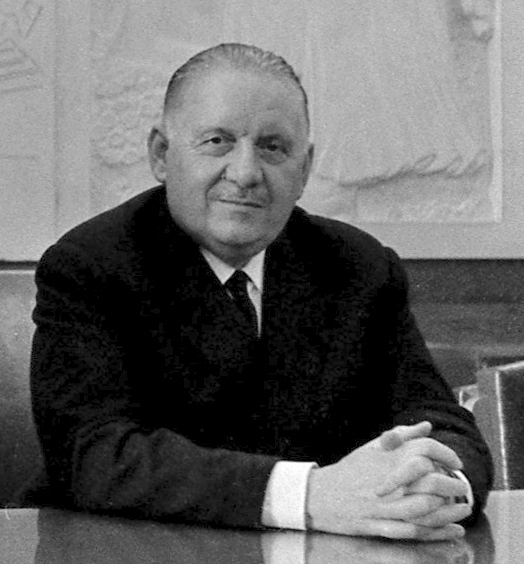Alain Poher

Alain Émile Louis Marie Poher (17 April 1909 – 9 December 1996) was a French centrist politician, affiliated first with the Popular Republican Movement and later with the Democratic Centre. He served as a Senator for Val-de-Marne from 1946 to 1995.
He was President of the Senate from 3 October 1968 to 1 October 1992 and, in that capacity, served twice as the country's interim president. A leading candidate in the 1969 presidential election, he was defeated by Georges Pompidou in the second round.
President of the Senate
During his tenure, Poher served with the Gaullist government of Prime Minister Maurice Couve de Murville, de Gaulle's close ally. Some even referred to this period as the first cohabitation. Despite sharp political differences, Poher was widely credited for model cooperation with the government.
Interim Presidency of the Republic
According to the order of succession established by the Constitution of the Fifth Republic, the president of the French senate assumes the nation's presidential powers and duties following the president's death or resignation, and becomes interim Head of State until the next election.
Poher's first service as interim president came on 29 April 1969, when Charles de Gaulle resigned. Previously he was one of de Gaulle's most notable political opponents and played a key role in the successful "no" campaign in de Gaulle's final referendum.
During his interim Presidency Poher continued to serve as Senate President. However, he resided during this time in the Élysée Palace as acting president.
Initially Poher tried to recruit General Marie Pierre Kœnig as a candidate for the Presidency and offered him his full support. Kœnig, however, declined to run, citing his poor health and stating that one general should not replace another general as the head of state.
After Kœnig's refusal, Poher himself announced his candidacy. Due to favourable polls he was viewed as the strongest opponent of Georges Pompidou and the only non-Gaullist candidate who had a real opportunity to win the election. Lack of a longstanding party machine, however, hurt his chances.
During his short term in office Poher's main task was overseeing the incoming election, in which he himself participated. However, during his tenure he took some major initiatives; for example, he fired longtime de Gaulle confidant Jacques Foccart, a Secretary-General for African Affairs and, unofficially, chief of the Gaullist secret services. (He returned to the Élysée after Pompidou's election).
Poher also ordered the directors of France's state-controlled radio and television networks to keep public media politically neutral and refrain from acting in the interest of any particular party. His successors followed this precedent. He also ordered the redeployment of a large police force in Paris in the wake of the May 1968 events.
His accomplishments helped Poher, previously largely unknown to the public, develop significant popularity during his interim presidency, despite his defeat in the election.
He served again as Interim President in 1974 after Pompidou died in office. This time, however, he did not run for his own term and stepped down after Valéry Giscard d'Estaing was elected.



































0 comments
Sign in or create a free account